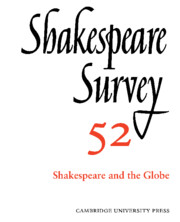Book contents
- Frontmatter
- Reconstructions of the Globe: A Retrospective
- ‘Useful in the Year 1999’: William Poel and Shakespeare’s ‘Build of Stage’
- Reconstructing the Globe: Constructing Ourselves
- From Liturgy to the Globe: the Changing Concept of Space
- The Arithmetic of Memory: Shakespeare’s Theatre and the National Past
- Maximal and Minimal Texts: Shakespeare v. the Globe
- William Shakespeare’s Romeo + Juliet: Everything’s Nice in America?
- Which is the Jew that Shakespeare Knew?: Shylock on the Elizabethan Stage
- A Little Touch of Harry in the Light: Henry V at the New Globe
- Gulls, Cony-Catchers and Cozeners: Twelfth Night and the Elizabethan Underworld
- The Globe, the Court and Measure for Measure
- Macbeth and the Antic Round
- Macbeth / Umabatha: Global Shakespeare in a Post-Colonial Market
- When All is True: Law, History and Problems of Knowledge in Henry VIII
- ‘All which it inherit’: Shakespeare, Globes and Global Media
- ‘Delicious traffick’: Alterity and Exchange on Early Modern Stages
- The 1998 Globe Season
- Shakespeare Performances in England, 1998
- Professional Shakespeare Productions in the British Isles January-December 1997
- The Year's Contributions to Shakespeare Studies 1 Critical Studies
- 2 Shakespeare’s Life, Times, and Stage
- 3 Editions and Textual Studies
- Books Received
- Index
‘All which it inherit’: Shakespeare, Globes and Global Media
Published online by Cambridge University Press: 28 March 2007
- Frontmatter
- Reconstructions of the Globe: A Retrospective
- ‘Useful in the Year 1999’: William Poel and Shakespeare’s ‘Build of Stage’
- Reconstructing the Globe: Constructing Ourselves
- From Liturgy to the Globe: the Changing Concept of Space
- The Arithmetic of Memory: Shakespeare’s Theatre and the National Past
- Maximal and Minimal Texts: Shakespeare v. the Globe
- William Shakespeare’s Romeo + Juliet: Everything’s Nice in America?
- Which is the Jew that Shakespeare Knew?: Shylock on the Elizabethan Stage
- A Little Touch of Harry in the Light: Henry V at the New Globe
- Gulls, Cony-Catchers and Cozeners: Twelfth Night and the Elizabethan Underworld
- The Globe, the Court and Measure for Measure
- Macbeth and the Antic Round
- Macbeth / Umabatha: Global Shakespeare in a Post-Colonial Market
- When All is True: Law, History and Problems of Knowledge in Henry VIII
- ‘All which it inherit’: Shakespeare, Globes and Global Media
- ‘Delicious traffick’: Alterity and Exchange on Early Modern Stages
- The 1998 Globe Season
- Shakespeare Performances in England, 1998
- Professional Shakespeare Productions in the British Isles January-December 1997
- The Year's Contributions to Shakespeare Studies 1 Critical Studies
- 2 Shakespeare’s Life, Times, and Stage
- 3 Editions and Textual Studies
- Books Received
- Index
Summary
Shakespeare’s association with something called ‘the Globe’ began in the late 1590s, when the first playhouse of that name was built in South-wark. Shakespeare’s plays had been and would be performed in other locations, but the Globe has held a near-monopoly on the imaginations of later generations. There have been Globe theatres in England, Germany, Japan, New Zealand, Canada and the United States and no doubt elsewhere. In 1997 ‘Shakespeare’s Globe’, reconstructed with assiduous scholarly care, opened near the original site on the South Bank of the Thames. Scale drawings, physical models, cinematic representations, editions of the plays, virtual reality tours and countless references in scholarly and popular literature sustain the almost automatic pairing of playwright and playhouse. ‘The Globe’ has become a near synonym for Shakespeare’s work in the theatre.
This would not have been the case if the playhouse had been given a different name such as the Rose or the Curtain, for the local and historical embeddedness of the Globe is balanced by its being at the same time a reference to the world as a whole. Such a name helps reinforce the frequent claims that Shakespeare's plays are universal either in their appeal or in the accuracy and completeness of their representation of the human world. Before such a contemporary expression was ever uttered, Shakespeare had become a 'global' author.
- Type
- Chapter
- Information
- Shakespeare Survey , pp. 183 - 200Publisher: Cambridge University PressPrint publication year: 1999
- 4
- Cited by



